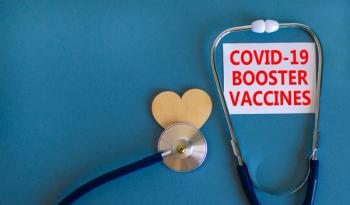
COVID-19
Latest News

Latest Videos
Podcasts
CME Content
More News

COVID-19 misinformation interventions should involve public health experts, establish consistent outcome measures and more to address health misinformation at individual, community and systems levels, according researchers of a recent study.

A recent study revealed that virtual urgent care (VUC) had minimal impact on emergency department visits or hospital admissions in Ontario, Canada, during the COVID-19 pandemic. However, a significant number of study participants who initially sought virtual urgent care eventually attended an emergency department in person.

The risk of stroke is not as likely for adults 65 years and above who have taken the Pfizer-BioNTech and Moderna COVID-19 bivalent vaccines. However, there may be an elevated risk of stroke when COVID boosters are paired with high-dose flu vaccines, particularly in adults 85-years-old and above.

Authors of a recent JAMA Network Open study expressed there have been few reported COVID surveillance studies of childcare centers and none in the U.S. Authors stress that it's essential for policymakers to understand the real risk of COVID spread in CCCs and households so they can apply suitable mitigation measures if there were to be another surge or new variants to come about.

At this year’s ID Week conference in Boston, Igho Ofotokun, MD, MSc, FIDSA, Grady Distinguished Professor of Medicine at the Emory University School of Medicine, shared the latest data that COVID-19 research team, RECOVER, has gathered on Long COVID and its symptoms.

There are nine grant awards of $1 million each for up to 5 years — totaling to overall $45 million in grants — that would mainly support underserved, rural, vulnerable, and minority populations that are disproportionately impacted by the effects of Long COVID

Those with certain comorbidities, including peptic ulcer disease and renal failure, were at additional risk of developing C diff infection.

Researchers investigated methods for measuring prior exposure in patients with suspected, undocumented COVID-19 infection to give better access to care and counsel.

Vaccine manufacturers have publicly announced that the boosters would be ready this fall, and the FDA anticipates they will be available “in the near future.”

Though the CDC reported BA.2.86 was detected in only five different countries as of last week, new reports claim more cases of the variant have been detected in the U.S. and other countries within the last few days.

This clinical trial is a part of the NIH's Researching COVID to Enhance Recovery (RECOVER) Initiative, aimed at understanding, treating and ultimately preventing the symptoms experienced by individuals following SARS-CoV-2 infection.

Cognitive deficits were similar to the effects of being hospitalized during illness or an age-related decline of 10 years in age.

Study results showed no significant association between those who bite their nails and SARS-CoV-2 infection, in addition to a lower rate of infection for those who wear glasses compared to those who don’t wear glasses.

In a study conducted from January to September 2022, 268 United States counties within 22 states participated in the U.S. Centers for Disease Control and Prevention’s National Wastewater Surveillance System (NWSS).

Long COVID’s effect on people’s basic, daily needs can affect their recovery and long-term health and well-being.

Most private health insurance plans are required to cover vaccines for COVID-19 without patient cost-sharing.

To decrease hospital strain and overloaded capacity, and support those groups who are affected, researchers suggest the need for enhanced efforts at the regional and state levels to coordinate transfers and balance load across hospitals.

Results reported in the journal Clinical Infectious Diseases did show protection against serious outcomes (emergency room visits, hospitalizations,death) among adults,18-50, with cancer and cardiovascular diseases but no such benefit among those without those diseases. The study also showed no Paxlovid benefit among those with asthma and chronic obstructive pulmonary disorder.

In the first year of the pandemic, there was a 14% rise in the diabetes rate in children. In the second year, the rate rose 27% from pre-pandemic levels.

In this population-based cohort study, researchers compared the risks of incident cardiovascular, neurological, and mental health conditions and rheumatoid arthritis in a year following COVID hospitalization to three different groups: pre-pandemic hospitalization for influenza, pre-pandemic hospitalization for sepsis and hospitalization for sepsis post-pandemic.

In efforts to find the effectiveness of metformin, ivermectin and fluvoxamine, researchers of the study observed the medications in adults aged 30 to 85 years who were overweight or obese and had been diagnosed with COVID-19 within the last three days.

Weekly surveillance monitoring, also known as rapid cycle analysis, of more than 245,000 COVID-19 mRNA vaccine doses did not detect a safety signal for any outcome 21 days after vaccination.

The Biden-McCarthy leaves $5 billion intact for coronavirus vaccine and treatment research, according to multiple media reports.

Paxlovid will continue to be accessible at no charge for adults and eligible children ages 12 to 18 who are not covered by the approval.

Results reported in JAMA comparing Black and White populations show a narrowing and then leveling off of excess mortality and potential years of life lost before the difference widened again in 2020.






























